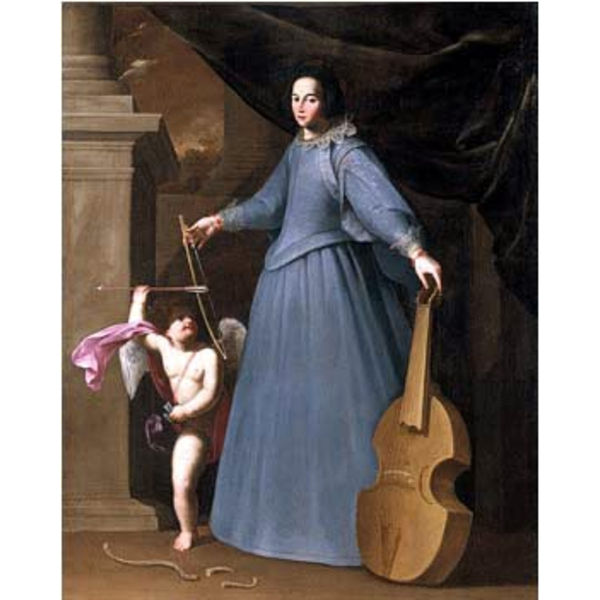Frontispiece of Vicenzo Galilei’s Dialogo della musica antica et della moderna, detail (Florence, 1581)
Claudio Monteverdi, “O Mirtillo,” from the Fifth Book of Madrigals (1605), performed by Rinaldo Alessandrini and Concerto Italiano:
Anthology 1
Giulio Caccini, “Dovrò dunque morire,” from Le nuove musiche (1602), perfromed by Andreas Scholl:
Anthology 2
John Dowland, “Flow My Tears,” from the Second Book of Songs or Ayres (1600), performed by Emma Kirkby and Anthony Rooley:
Anthology 3 and Figure 2.3
Emilio de’ Cavalieri, “Dalle più alte sfere,” from La pellegrina (1589), first intermedio: (Philippe Jarousky, Hamburg)
Example 2.1 (printed example begins at 4:59)
Jacopo Peri, L’Euridice. Complete performance of Peri’s Euridice by the students at the University of Illinois, directed by John Walter Hill. With translation by Howard Mayer Brown:
Example 2.2 (printed example begins at 20:56)
Claudio Monteverdi, “Cruda Amarilli,” from the Fifth Book of Madrigals (1605):
Example 2.3 (printed example begins at 0:19:00)
Giulio Caccini, “Amor ch’attendi,” from Le nuove musiche e nuova maniera di scriverle (1614); Giulio Caccini (1551-1618): Duo Sospiri: Kathrine Brandt, soprano & Lars Hedelius-Strikkertsen, baroque guitar
Example 2.4 (printed example begins at 0:00)
Sigismondo d’India, “Infelice Didone” from Le musiche , Book 5 (1623); performed by Aura Gutierrez (singer) and Seung-min Lee (harpsichord):
Example 2.5 (printed example begins at 1:06)

Fabio della Cornia. Portrait of Leonora Baroni
Image discussed on p. 31
Global Resources for Chapter Two
NEW: Activities and Projects
- Compare Monteverdi’s “O Mirtillo” with the setting by Luca Marenzio (1595)
2. Compare the content, layout, paratextual information, function, and intended audience for the printed music discussed in this chapter: Caccini’s Le nuove musiche, Monteverdi’s Il quinto libro di Madrigali, and Dowland’s Second Book of Song and Ayres, Peri’s Euridice.
3. Compare a scene from Caccini’s and Peri’s settings of Rinuccini’s Euridice.
4. For singers: using Caccini’s Le nuove musiche, add ornaments to any early Italian song in your repertory.
Music editions (facsimiles and modern editions):
- Rinuccini, La dafne (Florence, 1600)
- Caccini, Giulio. Le nuove musiche (Florence, 1602)
- Caccini, Giulio, Euridice (Florence, 1601)
- Dowland, John. The Second Book of Songs or Ayres (1600). This German website devoted to John Dowland lists the poems for all the songs in the Dowland’s Second Book along with embedded videos of each song.
- Galilei, Vincenzo, Dialogo della musica antica, e moderna
- Monteverdi, Claudio, Il quinto libro di madrigali (canto part) (Venice, 1608)
- Peri, Jacopo, Euridice (Florence, 1601)
- Rinuccini, Ottavio, Euridice (Florence, 1600) – libretto
Further Reading
Brosius, Amy. “‘Il Suon, Lo Sguardo, Il Canto’: The Function of Portraits of Mid-Seventeenth-Century Virtuose in Rome.” Italian Studies 63, no. 1 (2008): 17–39. http://www.worldcat.org/oclc/4636501968
Carter, Tim. Monteverdi’s Voices: A Poetics of the Madrigal. New York: Oxford University Press, 2024. https://global.oup.com/academic/product/monteverdis-voices-9780197759196
Carter, Tim. Music in Late Renaissance and Early Baroque Italy. Portland, OR: Amadeus Press, 1992. http://www.worldcat.org/oclc/26774707
Carter. Tim and Francesca Fantappiè. Staging Euridice: Theatre, Sets, and Music in Late Renaissance Florence. Cambridge: Cambridge University Press, 2022. https://worldcat.org/en/title/1257315127
Chafe, Eric Thomas. Monteverdi’s Tonal Language. New York: Schirmer Books, 1992. http://www.worldcat.org/oclc/24142319
Coelho, Victor. “The Players of Florentine Monody in Context and in History, and a Newly Recognized Source for Le nuove musiche.” Journal of Seventeenth-Century Music 9, no. 1 (2003). http://www.sscm-jscm.org/v9/no1/coelho.html
Gerbino, Giuseppe. Music and the Myth of Arcadia in Renaissance Italy. New Perspectives in Music History and Criticism. Cambridge and New York: Cambridge University Press, 2009. http://www.worldcat.org/oclc/268793380
Hanning, Barbara Russano. “Glorious Apollo: Poetic and Political Themes in the First Opera.” Renaissance Quarterly 32, no. 4 (Winter 1979): 485–513. http://www.jstor.org/stable/2861413
Hill, John Walter. Roman Monody, Cantata, and Opera from the Circles around Cardinal Montalto. 2 vols. Oxford Monographs on Music. Oxford: Clarendon Press; New York: Oxford University Press, 1997. http://www.worldcat.org/oclc/36352438
Holman, Peter, Dowland: Lachrimae (1604). Cambridge Music Handbooks. Cambridge and New York: Cambridge University Press, 1999. http://www.worldcat.org/oclc/48138566
Katz, Ruth. “Collective ‘Problem Solving’ in the History of Music: The Case of the Camerata.” Journal of the History of Ideas, 45, no. 3 (July–September 1984): 361–77. http://www.jstor.org/stable/2709230
McClary, Susan. Modal Subjectivities: Self-Fashioning in the Italian Madrigal. Berkeley: University of California Press, 2004. https://www.jstor.org/stable/10.1525/j.ctt1pq00j
Monson, Craig. “Songs of Shakespeare’s England,” in The World of Baroque Music: New Perspectives, ed. George B. Stauffer. Bloomington: Indiana University Press, 2007. http://www.worldcat.org/oclc/65165344
Murata, Margaret. “Image and Eloquence: Secular Song.” In The Cambridge History of Seventeenth-Century Music, ed. Tim Carter and John Butt. Cambridge History of Music. Cambridge: Cambridge University Press, 2006. http://www.worldcat.org/oclc/57893415
Ossi, Massimo. Divining the Oracle: Monteverdi’s Seconda Prattica. Chicago: University of Chicago Press, 2003. http://www.worldcat.org/oclc/51009065
Ossi, Massimo. “Monteverdi, Marenzio, and Battista Guarini’s ‘Cruda Amarilli.’” Music & Letters, vol. 89, no. 3 (August 2008): 311–36. http://www.jstor.org/stable/30162995
Palisca, Claude V. “Aria Types in the Earliest Operas.” Journal of Seventeenth-Century Music vol. 9, no. 1 (2003). http://www.sscm-jscm.org/v9/no1/palisca.html
Palisca, Claude V. The Florentine Camerata: Documentary Studies and Translations. Music Theory Translation series. New Haven: Yale University Press, 1989. http://www.worldcat.org/oclc/17648990
Rowland, Ingrid. Giordano Bruno: Philosopher Heretic. New York: Farrar, Straus and Giroux, 2008. http://www.worldcat.org/oclc/180751451
Tomlinson, Gary. Monteverdi and the End of the Renaissance. Berkeley: University of California Press, 1990. https://search.worldcat.org/title/22189944
Treadwell, Nina. “She Descended on a Cloud ‘From the Highest Spheres’: Florentine Monody ‘alla Romanina.’” Cambridge Opera Journal 16, no. 1 (March 2004): 1–22. http://www.jstor.org/stable/3878302
Wistreich, Richard. Warrior, Courtier, Singer: Giulio Cesare Brancaccio and the Performance of Identity in the Late Renaissance. Aldershot, Hants: Ashgate, 2007. http://www.worldcat.org/oclc/648340259
Wells, Robin Headlam. “John Dowland and Elizabethan Melancholy.” Early Music 13, no. 4 (November 1985): 514–28. http://www.jstor.org/stable/3127229
